Our implementing partner, ZOA, has completed the topography study allowing to identify the natural water sources which will undergo protection and sanitation .
An Akawa Project News Update - November 2021
Dear Friends of the Akawa Project,
The third Quarter of 2021 has been one of progress but also of bumps on the road. We have been able to move forward with implementing some activities yet have also been slowed down on others and have had to make some difficult decisions as well. As is common in Project management we keep our aim in line and adapt to circumstances for the better, and as the saying goes "If the plan doesn't work, change the plan, but never the goal ." We tell you all about this in our third News Brief of the year.
The topography study : status completed
Our implementing partner, ZOA, has completed the topography study allowing to identify the natural water sources which will undergo protection and sanitation .
The topography study which was in progress when we last reported has been conluded with the following key findings:
- What ?
20 water sources will be protected
- Where ?
9 hills around 2 Washing Stations (Nyagashiha and Rusekabuye)
- Who ?
For 1175 households
How were theses sources selected ?
Focus was put on first identifying hills with little or no easy access to fresh water. An engineer was then contracted to identify, with the local community leaders, the existing sources.
A total of 36 sources were visited and assessed based on their outflow (minimum 3 liters per second being the requirement), their accessibility for local communities, and their current state.
Out of these, 20 were retained to be worked on by the NGO. This will allow us to provide a safer and cleaner access to drinking water to a total of 1175 households (almost 6000 direct beneficiaries !).
Here below is our team-mate "JP" and the ZOA water engineers at a stream used (mostly) by kids to fetch water. The fact that it is mostly youth and women tending to the families water needs makes it even more necessary to secure the sources access and give them a safe and clean supply !
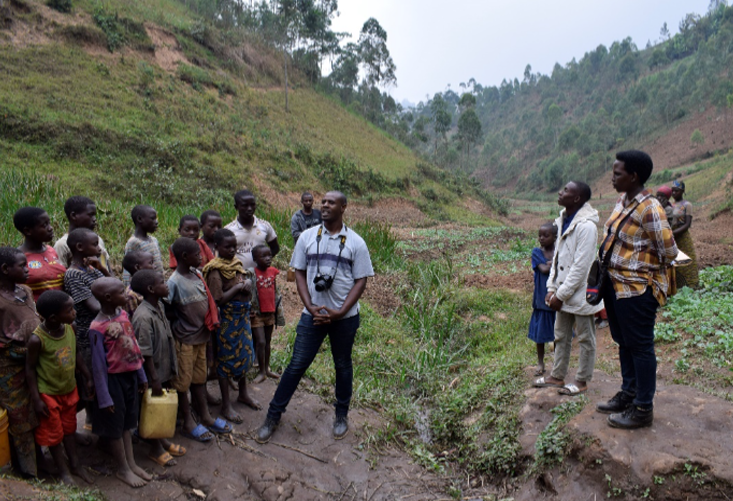
Goats distribution resumed
One of the aims we constantly have in mind is to increase soil fertility for farmers to have healthy yielding coffee trees. We wanted to associate the theory the Leader farmers receive in the trainings with an incentive. Topography being somehow of a challenge in the Project area we could not easily chose to donate Cows to our members and we opted for goats instead. Each Leader farmer is to receive a goat in order to help with creating manure for soil nurturing. We do realize this is a small step towards a bigger goal but feel that the Leaders will be benefiting from these in many ways.
Three rounds of distribution had already taken place in the second Quarter of the year and three followed in September.
24 goats were donated to the Leader Farmers of Kajabure, 53 to those of Rubirizi, and 21 handed-over in Runyinya allowing the total of distributed goats to reach 225 this year. Beyond simply distributing these goats to exemplary Farmers the social cohesiveness that this will create is of importance as all future baby goats will be given by the Leaders to their neighbour Farmers, creating a positive cycle in the Community.
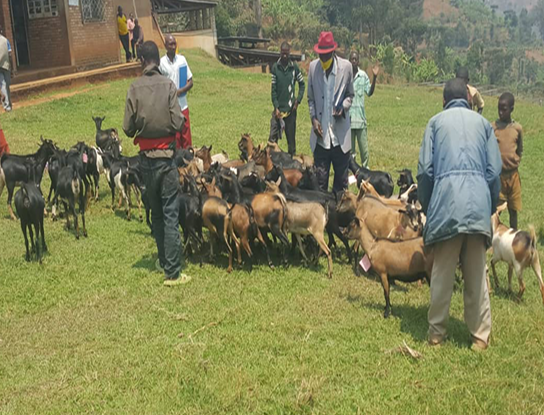
When discussing these distributions with our local partner we were pleasantly surprised to hear that a Veterinarian is actually present at each distribution, and here is why:
"We have thought of associating the municipal veterinary technician in this activity so that he can examine the goats to see if they are showing clinical signs of sickness, but also so that leaders can get in touch with the latter for any questions and to allow to keep flocks that are healthy and prevent perverse effects on a noble program of satisfaction"
Dieudonne Ngowembona
Operations Manager
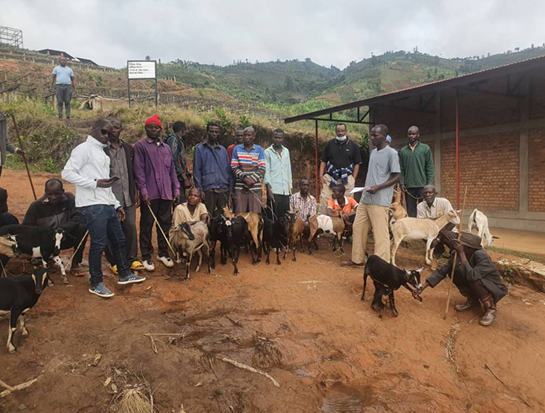
Meet one of the trainers
As is now customary in our News Brief we take you all the way to Burundi to meet someone special to the Akawa Project, in this edition we bring you the insights, in his own words, from Bernard Kubwimana, Agronomist at the Runyinya Washing Station.
Akawa News brief:
Hi Bernard, could you tells us about you and your role in the Project?
Bernard:
I am an Agronomist based at the Runyinya Washing Station. I have been based here since 2018 when I joined the Project. The Community around the Washing Station comprises of a few thousand coffee farmers of which four hundred are part of our registered farmers.
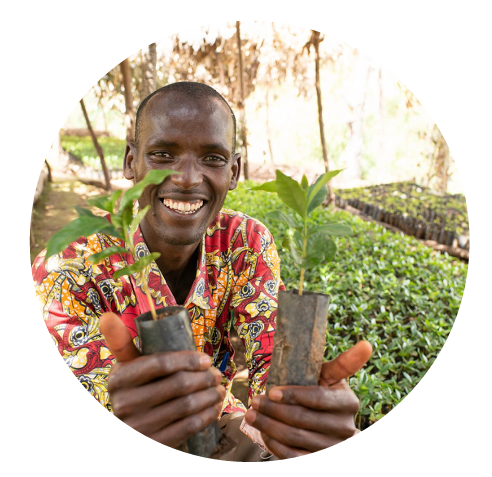
Akawa News brief:
What is the relationship between you and the Farmers ?
Bernard:
The Farmers rely on us for our techincal expertise. We train their Leaders on Good Agricultural Practices and the Leaders train on average 40 other farmers each.
Akawa News brief:
This year's harvest has been one of the worst in recent history. As first line of contact with the Farmers what can you tell us ?
Bernard:
Indeed this has been a very difficult harvest and therefore a difficult year for many farmers. The ones with small plots or bad farm management have had even less coffee to sell to the Station. This only goes to show the need to continue training them but also to distribute healthy planting material. Most of the coffee trees in the area I cover are very old and we will need to explain to farmers why it is ok to remove old trees in order to plant new ones as they are often reluctant to do so due to the waiting period before new trees become productive. But I believe that having gone through such a bad season with low volumes produced they will be more keen to plant new seedlings.
Akawa News brief:
Your washing station will soon be equipped with a bigger and more modern nursery bed than the one you currently have, how will this change things for you and the farmers ?
Bernard:
I simply cannot wait, having seen pictures of the one that was build in Kirasa we are very eager to see ours come out of ground. This will allow us to grow more coffee trees for the community and also have fruit, vegetable, and shade trees to give to the farmers.
Akawa News brief:
Visitors from abroad have not been able to visit you in the past year and a half, what would you like to tell them ?
Bernard:
We are very grateful for their support, both by buying the coffee produced by our Farmers and also by supporting our growth with investment and helping us train the farmers. I hope to see many visitors coming back soon to my Washing Station,
Be welcome !
Shifting gears on the Gender Pillar !
Twists of events are common in all aspects of Project execution, and what matters is how we learn and grow from these.
In the third Quarter of this year we have had to make the difficult decision to part ways with the Organisation which we had been in discussions with for almost 18 months to handle the Gender pillar of our Project. This worldwide Organisation with it's Gender focused office in Burundi seemed to be the perfect fit to handle the Gender pillar, but due to differences of view on the implementation, changes in the initial proposal received, and last minute constraining financing terms imposed on us we have decided to go back to the drawing board.
Having bid fare-well to our now ex-future partners we must find new friends whom we will be able to entrust with the management of the Gender pillar. This, as we write, is work in progress with various leads being explored and we hope to bring news in our next edition about who this new partner will be !
Kirasa nursery beds are ready!
The Kirasa Washing Station had been chosen to receive the first new nursery bed, allowing us to have a pilot and example to follow for construction on the remaining locations. This is now done with the Station having been fitted with not one but two nursery beds ! One will be dedicated to growing coffee tree seedlings whilst the other will receive fruit, vegetable, and shade tree seedlings which shall also be distributed to the Farmers around the Station.
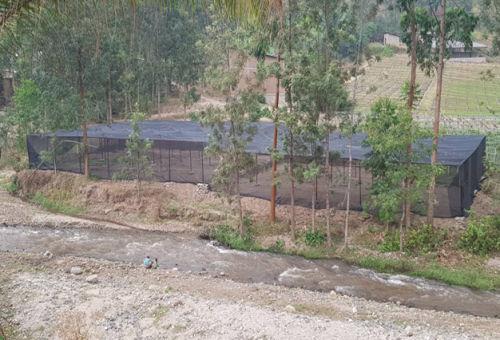
The beds are made of solidly anchored poles and fitted with proper shade nets, this is to avoid constant maintenance or replacement of wood-made nurseries and even the collapsing of these during storms. Adding shade nets to replace the traditional banana leaves ensures protection from excessive sun which is necessary for "baby" coffee trees but also ensures that enough rain water can make it to the seedling pots.
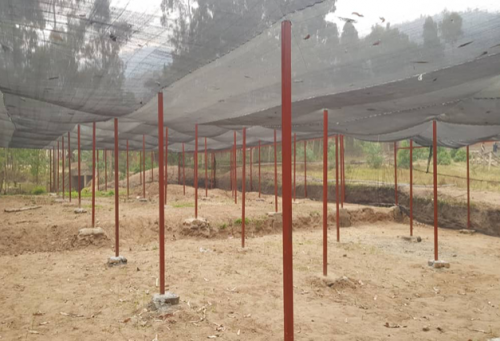
We are soon going to start populating these nursery beds with seedlings and train local staff to manage the beds which, by their size and expected production output, are a rather impressive environment to be evolving in for them !
With all winds in our favour the beds are planned to host 200'000 seedlings each, we expect in the initial years to have these at least half-full depending on the availability of coffee seeds of which the distribution is managed and regulated by the Government.
With this pilot construction over we look forward to confirming the roll-out to other Washing Stations in the course of Q4 2021 and early 2022 and will keep you informed in our next News Brief.
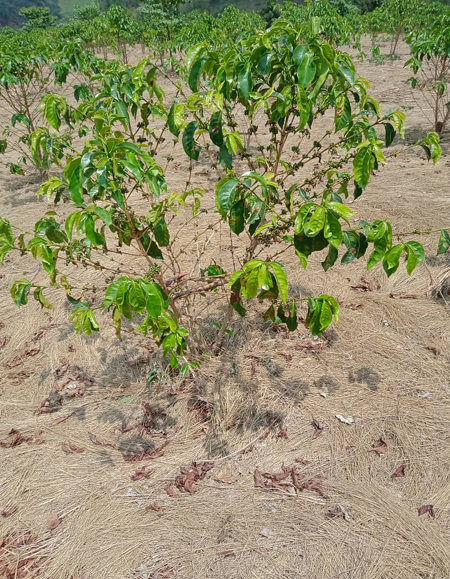
Thank you for taking the time to read about the Akawa Project, we hope you enjoyed and would you have any questions or comments please feel free to reach out by writing to info@akawa-project.com with a cc. to thomas.delbar@supremo.be
In the pipe for Q4
- Nursery beds construction rolls out to more stations
- Water sources construction to start
- Re-thinking the Gender pillar with a new implementing partner
- Farmer trainings & more Goats distributions
